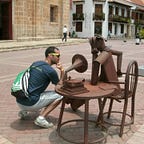This is What Progress Looks Like
More than half a century ago, James Meredith became the first black man to enroll at the University of Mississippi — Ole Miss — in my hometown of Oxford. In the riots that ensued, two were killed and hundreds injured. One of my childhood friend’s grandfather led the National Guard out that night to protect Meredith and the US Marshals struggling to keep him safe amid the violence that engulfed the campus. It was an ugly affair in which the beast of southern racism brought all of its ferocity to the battle.
Now, over 50 years later, as a member of the Mississippi diaspora, I can reflect on that moment though I did not live through it. As a 29 year old, I was not there when the shots were fired, when two people breathed their last breath, when the Guardsmen fought off the crowd at bayonet point. I was able to experience the hatred, the struggle, and the triumph as a child by running my hand along the bullet holes in the façade of the Lyceum building, where for nearly a decade, my mother served as Provost.
But bullet holes have a tendency of being plastered over accidentally, and even when they remain visible, they are often overlooked. Real progress doesn’t look like the covering of old wounds, nor does it look like their permanent exposure, which serves to remind us of our past. Real progress looks like my family, in the picture below.
I was born on November 11, 1985. At the time, my mother, a law professor was 39 years old, and while she and my father wanted more children, her age made it difficult to conceive again. So my parents adopted. Two younger brothers, Tom and Mike — 27 and 25 respectively — Vietnamese and black respectively. I grew up in Oxford, Mississippi, the son of a Lebanese mother with a Vietnamese younger brother and a black younger brother. The town that tried to reject James Meredith embraced my family. It was inconceivable, my mother told me, that our family could have ever existed in Mississippi in 1962. My family is what progress looks like. My brothers are what progress looks like. In 1962, Ole Miss did not want a black man, but in the late 1990s the University accepted a Lebanese woman as its chief academic officer, a woman who is the mother of a black child, a Vietnamese child, and a white child. My mother is what progress looks like.
I would be remiss to say that Mississippi has overcome its history of segregation and racism. The specter of slavery literally hovers overhead in the form of the Confederate battle flag parceled into the state flag. Mississippi’s former governor, Haley Barbour, campaigned on the slogan “save our flag,” in 2004. The state legislature punted the issue of whether to vote on a new design for the flag, and in a statewide referendum, the old flag was saved, much to the chagrin of all of those who fought for progress, and all of those who know that there is still fighting left to be done.
But 50 years after James Meredith’s heroism, I can look at my state and say that we have come a long way. I need look no further than my own family to see just how far.
